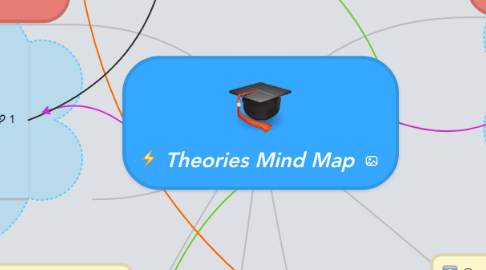Theories Mind Map
by Chad Watson

1. Technology Theories
2. SCOT Theory • SCOT theory which stands for Social Construction of Technology argues that that technology dose not shape human action, rather human action is what shapes all technology. • Technology is socially determined. Humans determine the success and failure of technology based on its usefulness during that particular time or to that particular group. This stands true, regardless of how impressive the technology is • The SCOT theory can be used to understand the social setting during the time of new advancement. • Can also be used when evaluating the success of failure of advancements or innovations in technology.
3. Learning Theories
4. Connectivism • Is a learning theory that emphasizes the role of social and cultural contexts. Seeing learning as the process of creating various connections and organizing these connections into networks of understanding • Vtgotsky’s zone of proximal development • Learning is more important that knowing. Both rest on the diversity of opinions
5. Cognitive Load • Cognitive load is rooted in the theory that our working memory is limited with the amount of information it can hold and the number of operations it can perform on that information. • Two kinds of memory Long term • Memory that we are able to store for a long time. Knowledge Working memory • This is the thinking and understanding process, working memory is then shipped to long term memory for storage • Too much information at once can cause overload which results in failure to remember • Important for teacher to have a good feel for the amount they are loading on their students. Teachers need to balance this with other deadlines. Need to make sure they are making it through all circular requirements without pushing too much on at once
6. Opposite sides of the equation
7. Philosophy of Teachnology • Similar to philosophy of teaching, speaks to how one can bring technology into their classroom. Studies technology and its affects • It is important to incorporate technology into your lesson to aid or advance the learning process. Technology needs to be seen as a teaching tool • The ideas you have about using technology within your classroom. Might differ based on resources, digital knowledge or grade level.
8. Media Ecology • Media Ecology follows the belief that not only does all technology shape human action but basically controls and influences every facet of life. It is the study of media and its effects on our environment • Opposite in its belief is the SCOT theory • Understanding the role of media in our society is important. We need to be educated and help educate the potential positive and negative influences that come from our media sources. • Using this theory we need to be able to understand how media shapes beliefs. How image is shaped by what’s popular on media and how trends start. We need to promote confidence in our youth to stand up against the mainstream if they feel so inclined.
9. Constructivist • The idea that each individual learner constructs knowledge for themselves. Individuals create meaning as they discover or learn. Since learning is to the individual each brings in there our perspective based on there on experiences. • In this sense learning always building on old information. Always growing. • As a teacher you are not there to lecture. It is your role to embrace collaboration and to support sharing within your class. • Students need to be able to monitor their own learning
10. TPACK • Teacher will need three different kinds of knowledge o Content (Information required for the lesson) o Pedagogy (Skill required to teach) o Technology (Digital prowess) • TPACK is the intersection of these three types of knowledge. Emphasis is on the knowledge that meets at these intersections • Understanding each kind of knowledge allows for proper and smart technology use. Ensures that you are using technology well fitted for the lesson at hand


